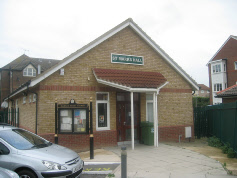


(Southend Association of Voluntary Services)
To see more details use the following links:
SAVS go to http://www.savs-
‘vinvolved’ go to http://vinspired.com/about-
SAVS Community Support Directory go to
http://www.savs-
To return to Part 1 of Interview, please CLICK HERE
Jo Mcpherson
Essex Youth Volunteer Development Manager
Head Office: SAVS
29-
Southend On Sea
Essex, SS1 1BW
tel: 01702 356004
Mobile : 07800 579 283
jmcpherson@savs-
Continuing to Talk with Jo Mcpherson of SAVS (7th January 2011)
(Part 2 of Interview)
RL: Do you sometimes have a job dragging young people into volunteering?
Introducing Young People to Volunteering
Jo: I think it’s to do with the way it is put to young people. Consider the project
we worked on with young people down here in St. Marks Hall. If we said to them, do
you want to volunteer, they would have probably said, well not really, but when you
have a chat with them and they say, well there’s not enough to do round here. We
then say to them, well what do you want to do about it, and they come up with the
ideas. They then write the applications for funding, they organise it, even down
to writing the rules and you’ll be really surprised because one of the first rules
they will write is, they will not tolerate drugs or alcohol in here. They are very
good at self-
RL: Do you think you’ve had enough support from the community, is there a way for the community to play a support role in encouraging young people here?
Jo: When you are talking about Rochford and especially about Rochford District, most
definitely. Sometimes you do still get the old fashioned approach where people will
sit down around a table and decide what they are going to provide for young people
in the community. That doesn’t work. Without involving the young people how can you
decide what they want. If they are involved from the start there is far more buy-
RL: You referred earlier to “the third sector”.
The Wider ‘Third Sector’
Jo: Yes the third sector isn’t just voluntary groups or charities, it’s also organisations such as social enterprises, community interest companies. It is growing rapidly. I think it is the way forward. If I need, for example, to go out and get a caterer, I will perhaps go to a College and use the students from there. I would far rather that the money is reinvested back into the College as opposed to a private company. So working with these sort of organisations is definitely a way forward.
A lot of charities can give far better service than private companies, in my opinion. An excellent example of that would be Meals on Wheels. A private company speaks to me of straight forward employment. The people who applied with the Women’s Voluntary Service, who have got quite a few of the contracts, obviously started by volunteering with that organisation, with a passion about helping the elderly; they are the sort of people who will go in and it’s not just Meals on Wheels, they’ll have a chat, they’ve got their eyes open, they look around and see if people have been in to see that elderly person, how that elderly person changes on a day to day basis, as against someone who is flying through the door, a different person each day.
RL: When we were talking earlier on, you were talking about the legalities and safety issues. As much as I can see the need for these in a very real way, does that sometimes shut out a lot of people who suddenly say, ‘Oh my goodness, this is institutional organisation and I don’t want to have anything to do with it’?
Countering Negative Views In Institutional Volunteering
Jo: I think it depends on what platform and what level you are talking about. For example, it was icy recently and snowy. I popped along to a neighbour’s to make sure he had my phone number in case he got isolated and needed something like milk etc. That’s being informal, that’s being a good citizen and a good neighbour. Now there does come a time where, if it was a stranger going into somebody’s house, you do need to protect vulnerable people.
So, if it’s a neighbourly thing that is completely different for that is informal volunteering, but if you are actually delivering a service, and saying you are going to deliver a service, that person should be able to realise that he is going to get a good quality service. So if, for example, that elderly gentleman had a befriending service come in, which are set up by quite a few charities, he’s going to expect a professional service, that they are sending in someone who knows the role they are coming in for, and that he feels safe with, comfortable with.
RL: With your experience, let’s suggest there are people out in the community who would like to serve the community, are there simple things you could suggest off the top of your head that people could do?
Possibilities ‘out there’
Jo: Well, it’s probably only a small thing but for instance, where there are church
yards, most Parish Councils pay for people to come in and maintain the church yards.
How easy for a group to take that over from the Council and save them that money.
A group litter-
RL: So it’s going to depend on level of complexity of what is being suggested?
Jo: Yes, if for example you went to decorate a community hall or church or whatever, and somebody fell off a ladder and broke their arm who, in today’s climate, would they hold responsible. That’s what risk assessment seeks to avoid and that’s where our wisdom and past experience may be able to help.
RL: Well thanks Jo, you’ve given us a great deal to think about. Thank you so much.
To return to Part 1 of Interview, please CLICK HERE
To see more on SAVS go to http://www.savs-
To see more in ‘vinvolved’ go to http://vinspired.com/about-
To see SAVS Community Support Directory go to http://www.savs-
